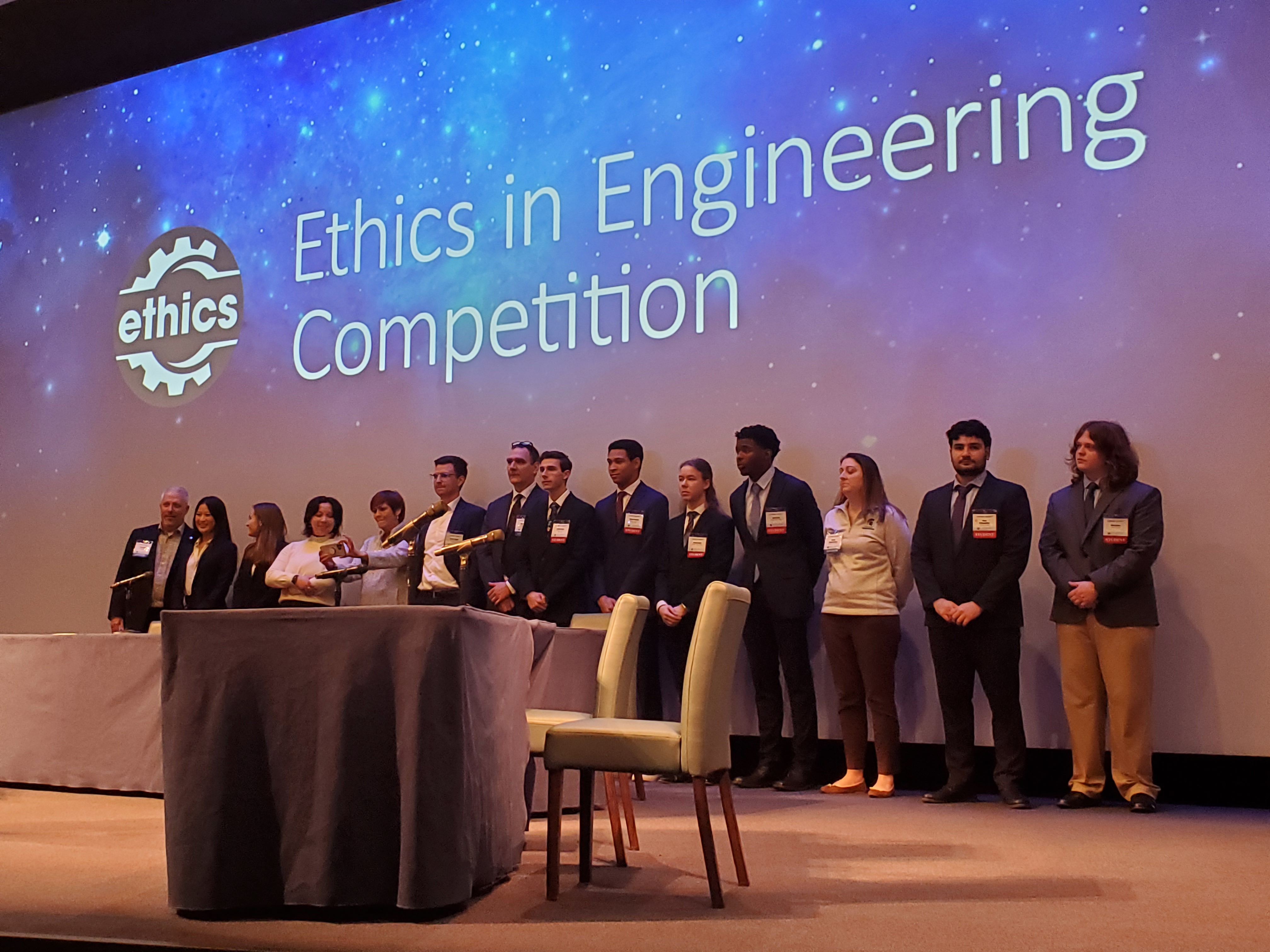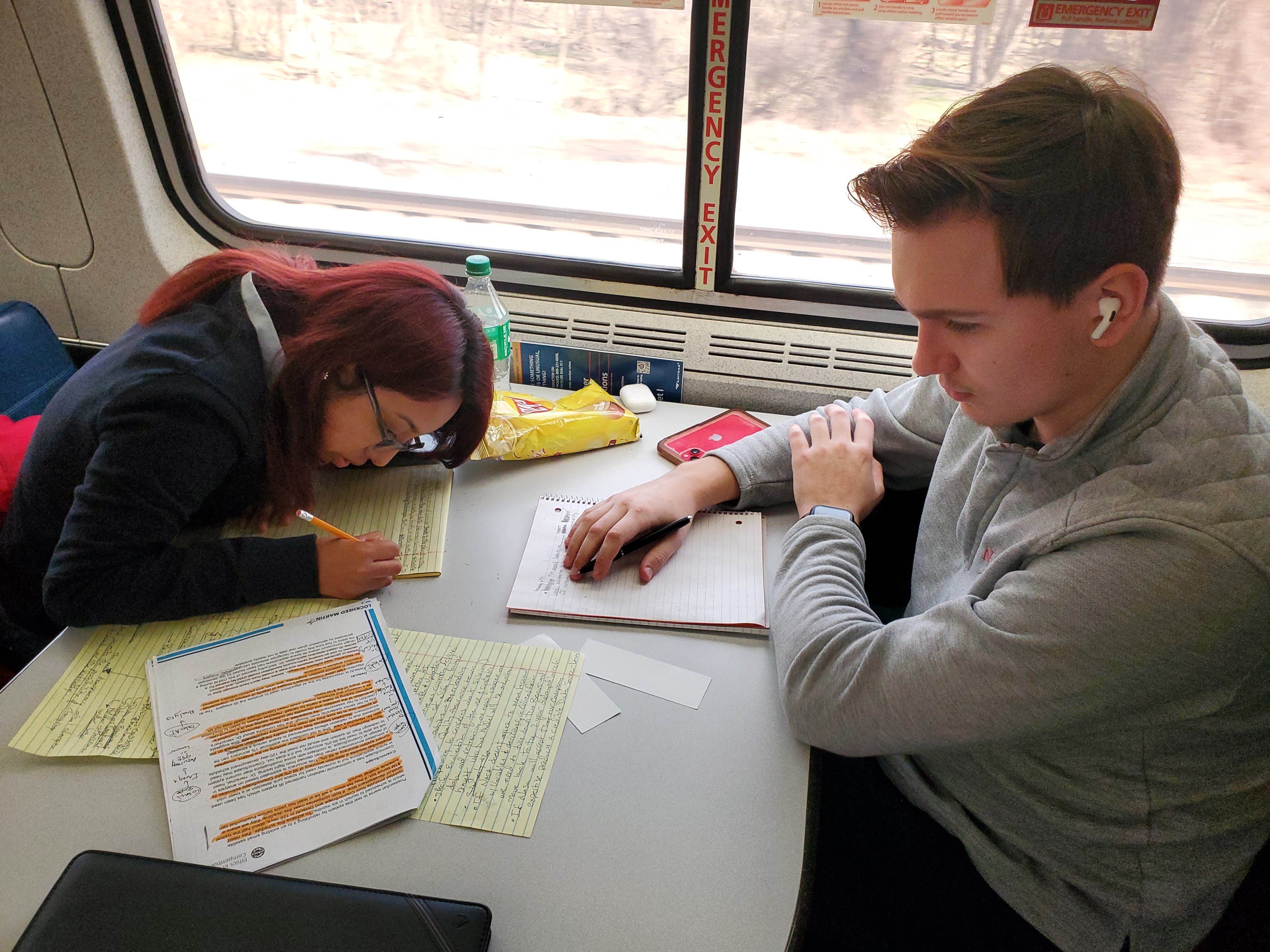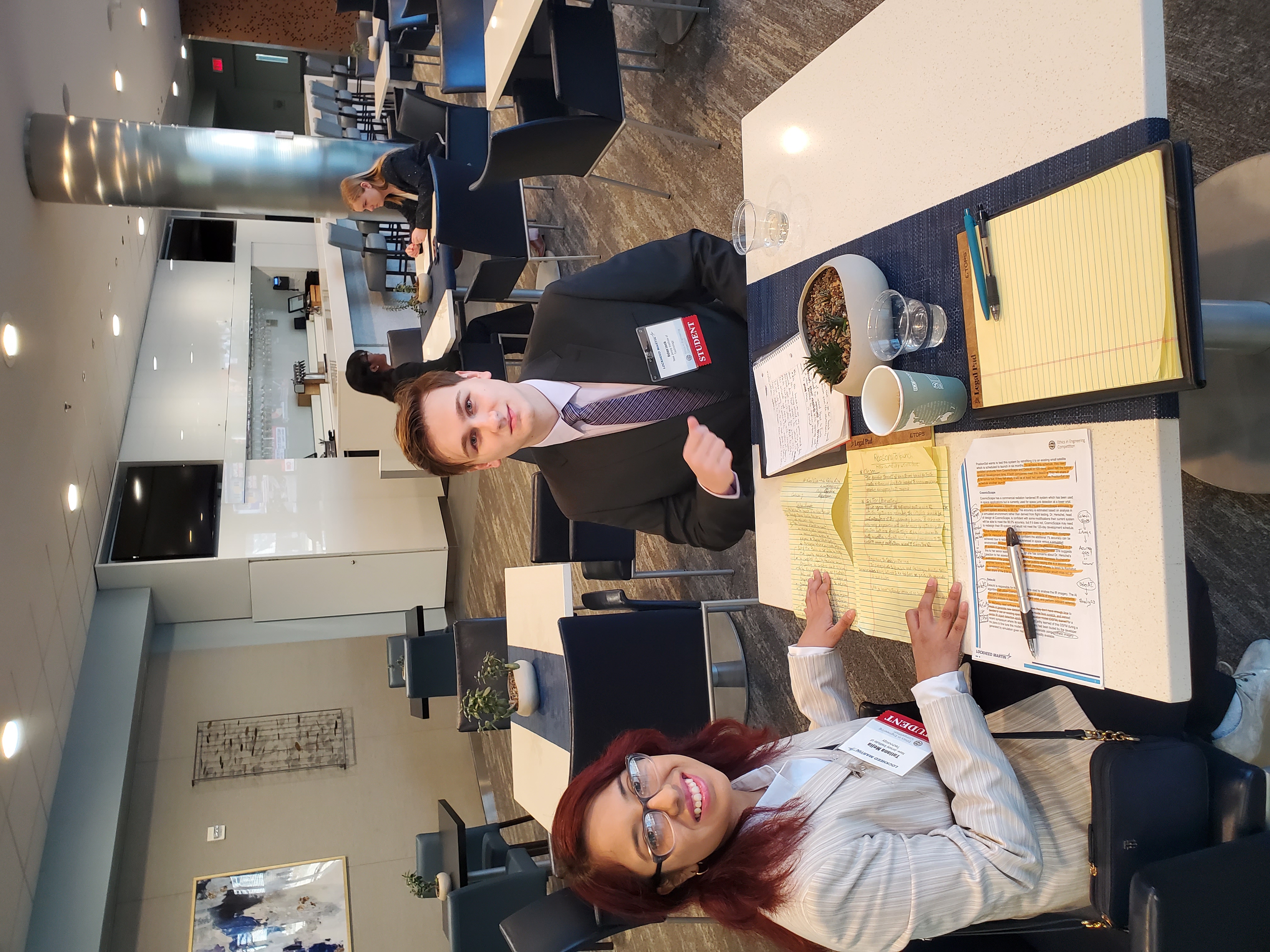Department News
News from the Department of Humanities
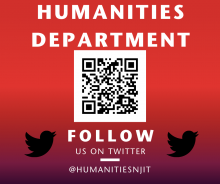
Heat and Humanity: NJIT Department Chair joins Museum of Political Corruption Roundtable
On June 26, 2025, Dr. Maurie J. Cohen, Professor and Chair of NJIT’s Department of Humanities and Social Sciences, participated in a nationally streamed panel discussion hosted by the Museum of Political Corruption's Veronica Medina as part of her Disrupt film series. The roundtable focused on The Hottest August, a 2019 documentary by award-winning filmmaker Brett Story, that captures a sweltering summer in New York City, where conversations about rent, racism, and looming climate breakdown swirl beneath the surface of everyday life.
Dr. Cohen joined fellow panelists Naomi Oreskes (Harvard University) and Story herself to explore how climate change, political distrust, and systemic inequality are converging in American life. Reflecting on the film’s unscripted interviews with ordinary citizens, Dr. Cohen emphasized the importance of recognizing lived experiences amid what he and other scholars have referred to as a national “polycrisis”: where climate, economic, and social instabilities intersect.
“Ordinary people aren’t thinking in disciplinary boxes,” Dr. Cohen noted during the event. “They’re coping with overlapping stresses: housing insecurity, job instability, environmental threats… and those don’t fit neatly into scientific or policy categories.”
Rather than a technocratic approach to these issues, Dr. Cohen draws upon his background in post-consumer futures and degrowth policy to advocate for community-led action; action that includes equitable narratives about sustainability and resilience that amplify the voices, like those heard in The Hottest August, too often marginalized in traditional policymaking.
Dr. Cohen further highlighted the role of the humanities in shaping these stories: “We don’t need more data,” he said. “We need better stories. Stories that help people locate themselves in this transition and believe that change is still possible.”
The event marked another important intersection between Dr. Cohen’s research and public engagement. As editor of Sustainability: Science, Practice, & Policy, and co-founder of the Future Earth Knowledge-Action Network on Systems of Sustainable Consumption and Production, Dr. Cohen continues to position NJIT at the forefront of discussions of environmental humanities and civic discourse.
The Museum of Political Corruption is a nonpartisan nonprofit dedicated to educating and empowering the public on issues of corruption, justice, and civic life. The Disrupt Film Series was designed to build on that mission using provocative documentaries and conversations like this roundtable to challenge injustice and inspire change.
Watch the full roundtable discussion here and follow the Museum of Political Corruption for upcoming events in the Disrupt series.
Published 01 July 2025
Enhancing Communication: The Case for Teaching Public Speaking Skills to Autistic Individuals
By: Nigora Raufova MS, CCC-SLP, TSSLD (Originally published in Autism Spectrum News)
“My stomach feels kind of weird,” an autistic middle school student once said to me when I asked him how he was feeling before he went on stage to co-host a talent show with me. I told him that he was experiencing anxiety, and people describe this as having “butterflies in your stomach.” As a speech language pathologist working in a specialized school in the Bronx, I am often called upon to host talent shows, rallies, ceremonies, and other school events. About a year ago, I began to choose three middle students to co-host these shows with me. For most typically developing people, being called upon to speak in a public setting induces anxiety. People may increase their stutters, panic, and some even forget their scripts or, colloquially speaking, “blank out.” This happens to almost all people; celebrities forget lyrics on a stage watched by thousands, politicians respond in nonsensical ways, and family members drop the occasional faux-paux. As an adjunct lecturer teaching Oral Presentations at a STEM school in New Jersey, I find myself discussing public speaking anxiety frequently. In fact, most people fear speaking in a public setting. So, why teach our people with autism public speaking skills? It is precisely for that reason we should. People with autism, like those without this diagnosis, may fail to speak successfully in a public setting. I believe a mark of an inclusive society would be to give individuals, regardless of disability, a microphone. This includes people who use augmentative and alternative means to communicate, such as a dynamic display device.
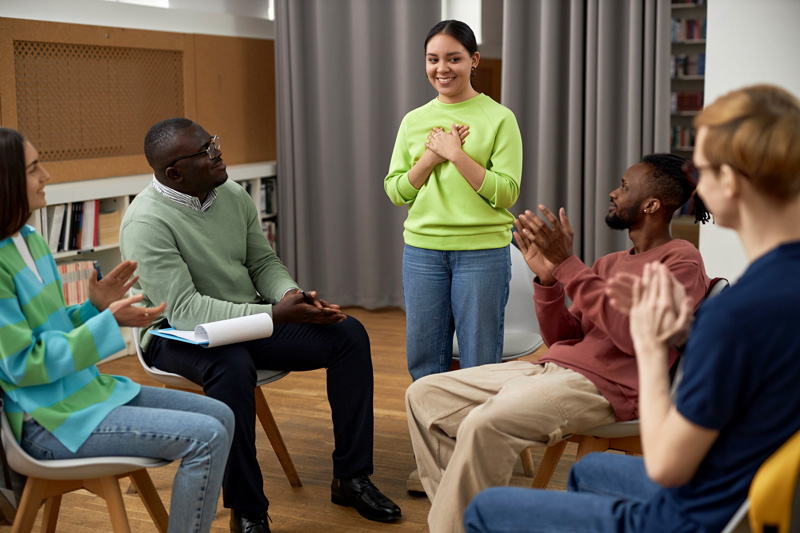
Speaking publicly presents an array of increased challenges for autistic people because they may have difficulties reading the audience, displaying nonverbal communication appropriate for the setting, and planning and preparing for their oral presentation due to a need for executive functioning support. Teaching my middle school students to conquer the stage and connect with their audience led to an incredibly proud moment for me as their speech language therapist. I had the pleasure of witnessing the glee my students felt from having people clap for them, cheer for them when they stumbled or froze, and smile from positive audience reactions. How can we expect autistic people to improve in communication if we do not give them that platform and welcome them into spaces typically held by mainstream communicators? In the school setting, aside from the confidence, teaching people with autism helps them advocate for themselves, encourages a discussion about emotions, regulation, a growth mindset, and can help target a multitude of goals, whether it be articulation, volume, conversations, and more. Nonverbal communication targeted may include appropriate body language, gestures, and facial expressions. On a societal level, having autistic people practice public speaking in actual public speaking spaces helps dismantle ableism. Aside from empowering autistic people, this practice educates other people that autistic people have valuable contributions to make and challenges stereotypes.
So, where does one begin exactly? A speech language therapist can start small: in the classroom. During push-in sessions in classrooms, students come up, face their class, and say how they feel or how their weekend was in front of the class as opposed to desks. This often makes children feel successful. In sessions, I have my students take my seat at the head of the kidney bean table. They often enjoy leading parts of the session and grow accustomed to a group of 3-6 people facing them. Classroom teachers in K-12 settings can have students co-host school events on stage, lead routine parts of the lesson, such as taking attendance in front of the class, and regularly pair students to engage in small group discussions.
While I advocate for teaching public speaking skills early, I also advocate for autistic college students to receive needed social support. In 2020, approximately “443,000 students on the autism spectrum” sought college degrees, and that number is expected to increase (Underhill et al. 2021). Social connections may increase retention rates and overall well-being (Ashbaugh et al. 2017). Sassoon et al. also highlighted that students who are typically developing “are often less willing to interact with individuals who display atypical verbal and nonverbal communication.” Students on the autism spectrum may feel isolated and “lack meaningful connections with peers,” and many colleges do not offer support for people with autism to thrive (Underhill et al., 2021). Negative side effects of a disconnected classroom include isolation, and many autistic students reported loneliness (Wolpe, 2024).
As an adjunct professor teaching Oral Presentations, I emphasize to all of my students that, like any other skill, communication can be targeted and improved upon. This holds true for all students, regardless of an autism diagnosis. Building rapport through icebreakers, student interviews, interactive games, and other engaging activities may help foster inclusive classrooms. On the first day of class, I ask all my students to interview each other and then share their responses to the following inquiries, “What do you need in order for us to create a positive and supportive environment?” This approach ensures that both the professor and the students take responsibility for fostering an inclusive environment. Students can be helpful and welcoming in small group discussions and share upcoming campus events and other social events. When presenting to the class, neurotypical students may use subtitles and visuals.
Professors should dedicate time for classmates to build social relationships. Giving students a chance to work one-on-one and in small groups, especially with specific questions, before placing them in front of the entire class may also help them. Throughout the semester, I teach everyone emotional regulation strategies to help calm oneself before a presentation, such as deep breathing, having students work with people they have not yet worked with, using video modeling, and pointing out the specific body language and facial expressions I may want to see during a presentation. I highly advocate including a mock job interview presentation. Studies show people with autism have difficulty obtaining and retaining a job. In stark contrast to the United Nations Convention on the Rights of Persons with Disabilities, which positions equal access to employment as a human right, autistic people around the world are chronically underemployed, even relative to people with other disabilities (Cheriyan et al. 2021).
Greater research is needed to explore the current supports and barriers in place in public speaking courses and institutions. I hope to bring this need to light so that professionals can start this work early and students will continue to progress so that by the time they transition to college, individuals can more readily immersive themselves into social circles, succeed in college, master job interviews, and beyond the postsecondary education setting. I invite parents to encourage their children to put on a living room show, sing, dance, and nourish their child’s talents. I hope to shed light on the needs of people with autism and give their voices a microphone.

Nigora Raufova MS, CCC-SLP, TSSLD, is a speech-language pathologist specializing in working with children with autism in a Title 1 school in the Bronx and provides early intervention services. Nigora also serves as an adjunct professor at the New Jersey Institute of Technology, where she teaches Oral Presentations. She holds a master’s degree from Columbia University. To reach the author, please email nraufova@gmail.com.
Works Cited
Ashbaugh, K., Koegel, R. L., & Koegel, L. K. (2017). Increasing social integration for college students with autism spectrum disorder. Behavioral development bulletin, 22(1), 183.
Cheriyan, C., Shevchuk-Hill, S., Riccio, A., Vincent, J., Kapp, S. K., Cage, E., … & Gillespie-Lynch, K. (2021). Exploring the career motivations, strengths, and challenges of autistic and non-autistic university students: Insights from a participatory study. Frontiers in Psychology, 12, 719827.
Sasson, N. J., Faso, D. J., Nugent, J., Lovell, S., Kennedy, D. P., & Grossman, R. B. (2017). Neurotypical peers are less willing to interact with those with autism based on thin slice judgments. Scientific reports, 7(1), 1-10.
Underhill, J. C., Ledford, V., & Adams, H. M. (2021). ‘Public Speaking is a Skill that Everyone Needs No Matter What’: Exploring Peer Perceptions toward Students on the Autism Spectrum in Basic Course Classrooms. Basic Communication Course Annual, 33(1), 8.
Wilson, K., & Dallman, A. (2024). Strategies for promoting neurodiversity and autism acceptance in higher education. Journal of Diversity in Higher Education.
Wolpe, S. M. (2024). Promoting Success in College: A Scoping Review of Autistic Students’ Postsecondary Education Experiences. Review Journal of Autism and Developmental Disorders, 1-19.
Cyberpsychology Student-Athlete Presents Research at International Conference
In July of this year, Cyberpsychology junior and épée fencer for NJIT athletics, Gala Krsmanovic, presented her research at the 33rd International Congress of Psychology (ICP 2024) in Prague. Krsmanovic’s research, conducted under the mentorship of Dr. Fadi Deek, sought to combine her passion for behavioral science with Dr. Deek’s expertise in informatics. The subject in question should be no stranger to anyone involved in academia: generative AI. In particular, Gala was interested in the impact the implementation of AI tools has had on the cognitive abilities of undergraduate students. Alongside Dr. Deek, Gala designed and disseminated a survey to over 200 NJIT students to measure their perceptions regarding their own use of AI technology.
Published in the International Journal of Psychology, Krsmanovic and Deek’s research paper, "Self-Reported Cognitive Effects of AI Applications on Learning", found that:
“…the usage of AI tools for college coursework has significant effects on the cognitive abilities of learners, specifically memorization, cognitive abilities such as problem-solving and critical thinking, and in-depth understanding of coursework material. However, no negative effect was shown on learners’ motivation.” (Krsmanovic & Deek, 2024)
Gala went on to present these findings to some of the over 3,000 attendees of the international conference. As one of the conference’s youngest presenters, Gala recalled being a bit nervous showcasing her research to a room full of experts from around the globe. Gala expressed gratitude towards her family, who attended virtually, as well as her partner, who supported her in person alongside Dr. Deek. “They were always by my side,” said Gala. Much to her surprise, however, Gala’s research attracted a crowd of enthusiastic listeners.
Though she had initially started this project out of her own personal curiosities, due to the relative novelty of AI technology, Gala found that her research was fulfilling a largely untapped niche in the field of behavioral science. According to Gala:
“I was surprised at how many people came to listen and the enthusiasm they showed. They started taking pictures of our slides, asking in-depth questions, and showed an immense interest that I did not expect but was delighted to see. After the presentation, we were approached by other academics who were all asking our future plans and who are also in the process of researching this new topic of the impact of AI on cognitive abilities as well.”
While the initial results of her research were significant, Gala is already working on a second iteration of the project which would see a much larger sample—taking the lessons learned from this study and working towards gaining further understanding of this prevalent issue. In the meantime, Gala plans to keep herself quite busy. Between her research, classes, and fencing practice, Gala can be heard taking the occasional break as she plays the piano in the campus center atrium. We’ll all certainly be cheering Gala on as she advances towards her future endeavors!
Krsmanovic, G., & Deek, F. P. (2024). The Impact of AI Tools on the Cognitive Abilities of Learners: A Survey-Based Approach. International Journal of Psychology, 59(S1), 23. Link to research paper
Published 30 September 2024
NJIT Students Compete in Lockheed Martin Ethics in Engineering Case Competition
For the second year in a row – and with the support of the Department of Humanities and Social Sciences, the College of Science and Liberal Arts, and the Newark College of Engineering – NJIT’s student team participated in the Lockheed Martin Ethics in Engineering Case Competition. The event, hosted annually at its corporate headquarters in Bethesda, MD, focused on case analysis and negotiation in a mock business meeting laden with ethical issues. This year’s case centered on asteroid detection, satellite-warning systems, and ethical practices and communication among subcontractors and contractors seeking to both protect the world and make a profit while under a deadline. In a field of more than seventy teams drawn from colleges and universities across the country, the students and faculty advisors shared experiences and enjoyed spirited interpretations and responses to the complexities of negating ethical concerns in cases that mix business, technical, political, and formal ethical concerns.
With the guidance of their faculty advisor, Dr. Gareth Edel, the two students on the NJIT team – Tatiana Mejia (freshman majoring in mechanical engineering) and Rylan Lech (sophomore majoring in mechanical engineering) – brought careful attention to case ethics and technical issues with a very strong showing in the preliminary round, outscoring the team from Tarleton State College (Stephenville, TX) who progressed to the third round of elimination play. Rylan and Tatiana presented strong arguments in the first elimination round, but unfortunately fell short against a strong contingent from the U.S. Coast Guard Academy. The Coast Guard cadets have been winners and finalists in previous years and the NJIT team enjoyed the opportunity to face off against such a highly regarded competitor.
Following their elimination, the NJIT team participated in visits to Lockheed Martin’s Global Emergency Operations Center and the company’s Rockville Security Intelligence Center, both facilities that are normally not open to college students or civilians. Tatiana and Rylan also received one-on-one advice on professional development, recruitment, career planning, and resume preparation. The students were additionally able to avail themselves of opportunities to network and discuss the case with members of other teams attending the event, as well as enjoy lunch with peers from the U.S. Coast Guard Academy. An especially notable high point of the experience was striking up a friendship with a solo competitor representing the University of Central Florida who became a practice partner in the preliminary stages of the competition.
The team used the visit as a chance to see the National Mall and monuments in Washington, DC. After a break to focus on coursework, both Tatiana and Rylan look forward to helping develop a student club and to supporting student participation in the competition in the future.
Published 08 March 2024
Biology Major Uses Her Journalism Skills To Shine A Light On Flooding In Newark
Sadia Mohiuddin, ’24, took a class journalism assignment to the next level by publishing her piece on Planet Forward, a solutions-oriented non-profit media outlet based at George Washington University that showcases student reporting about environmental issues.
Mohiuddin’s story – ‘’A call to fight: Organizations prepare for the next big flood in Newark, New Jersey’’ – looks at efforts by local advocates and researchers to help mitigate flooding issues in Newark.
The project began as a class assignment in Prof. Miriam Ascarelli’s Practical Journalism class. Mohiuddin, a biology major and a journalism minor who works as an undergraduate sustainability specialist for NJIT’s Office of Sustainability, said she was inspired to write about flooding after reflecting on her own experience during Hurricane Ida in 2021.
“I vividly remember waddling through chest-high murky water on my way back home from an event,’’ said Mohiuddin, who lives in nearby Elizabeth. “The morning after, I learned about the people who died in their apartments due to the flood. I couldn’t help but wonder: if I lived in that apartment, asleep and unaware of the impending danger, what would I do?’’
To pull her piece together, Mohiuddin did background research and interviewed three local experts: Nicole Miller, a member of Newark’s Environmental Commission and co-chair of Newark DIG (Doing Infrastructure Green); Viravid Na Nagara, a researcher at NJIT’s Center for Natural Resources specializing in stormwater management; and Meghana Parameswarappa Jayalakshmamma, a Ph.D. candidate in Environmental Engineering at NJIT studying microplastics in stormwater.
“I think the hardest part for me was combing through all the information I gained and deciding where it should go in the article,’’ Mohiuddin said. ‘’It was through this process that I was able to finalize a structure for the story."
When the piece was finished, Prof. Ascarelli encouraged Mohiuddin to submit it to Planet Forward. The article was accepted, opening the door to mentorship from Planet Forward’s editors.
The process, Mohiuddin admits, was intimidating at first but once she started interacting with the Planet Forward team, “I realized that I was, dare I say, having fun,’’ she said. “I think knowing that I wasn’t alone, and that someone was there to guide me in perfecting my piece, played a major role in relieving me of my worries.’’
Published 14 February 2024





